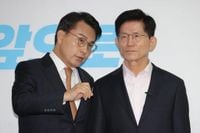On the night of May 9, 2025, tensions within South Korea's People Power Party (PPP) surfaced dramatically during a closed-door meeting where a significant decision was made regarding the party's presidential candidate. Yun Sang-hyun, a prominent member of the party, emerged as a vocal opponent to the overwhelming consensus among lawmakers who supported delegating authority for a candidate exchange to the party leadership.
Yun revealed to reporters after the meeting that 64 lawmakers voted in favor of this move, while only he and one other member opposed it. "I was deeply saddened to see our party's actions resembling those of the Democratic Party," he stated, expressing his discontent with the process that led to this decision. "It feels like we are just pushing through with numbers, similar to what we criticize the Democratic Party for doing. What’s the difference between us?"
During the meeting, many lawmakers showed their support for the candidate exchange, which Yun described as a forced unification without the consent of Kim Moon-soo, the current presidential candidate. He argued that this approach disregards the ethical implications of such a decision, emphasizing that many in the party were confused and concerned about Kim's previous promises. "This is a matter of political and ethical concern, not a legal one," he remarked, indicating that the party leadership should have reached an agreement beforehand regarding a unification manifesto.
Yun’s criticism extended to the potential fallout from this decision. He warned that candidates who might be excluded from the election process could harbor resentment, which could lead to significant internal strife within the party. "If we continue down this path, candidates who lose in the primary could protest vehemently against this forced unity," he cautioned. His sentiments reflect a growing anxiety among some members of the PPP regarding the party's direction and governance.
In recent months, the PPP has faced scrutiny for its handling of candidate selection and party unity, especially in light of the upcoming presidential election. The dynamics within the party have shifted, with many members feeling pressured to conform to the leadership's decisions, a situation Yun openly criticized. "This is not how a democratic party should operate," he stated, reiterating that the party should prioritize transparency and the voices of its members.
Yun's remarks come against a backdrop of increasing political tension in South Korea, especially with the Democratic Party's recent maneuvers regarding their own candidate selection. The PPP's approach has drawn comparisons to the Democratic Party's strategies, which Yun vehemently opposes. He fears that the PPP risks losing its unique identity if it continues to adopt similar tactics.
As the political landscape evolves, the PPP's internal conflicts may shape its strategy leading up to the election. Yun's stance represents a faction within the party that advocates for a more democratic process in candidate selection, one that respects individual candidates' autonomy and the ethical obligations of the party. The upcoming months will be critical for the PPP as it navigates these turbulent waters, balancing the need for unity with the necessity of honoring the principles of democracy.
In conclusion, the events of May 9 serve as a significant indicator of the PPP's internal struggles and the broader implications for South Korean politics. As lawmakers grapple with the challenges of leadership and candidate selection, the party's future direction remains uncertain. Yun Sang-hyun's opposition may resonate with a segment of the party that seeks a return to democratic ideals and ethical governance.




